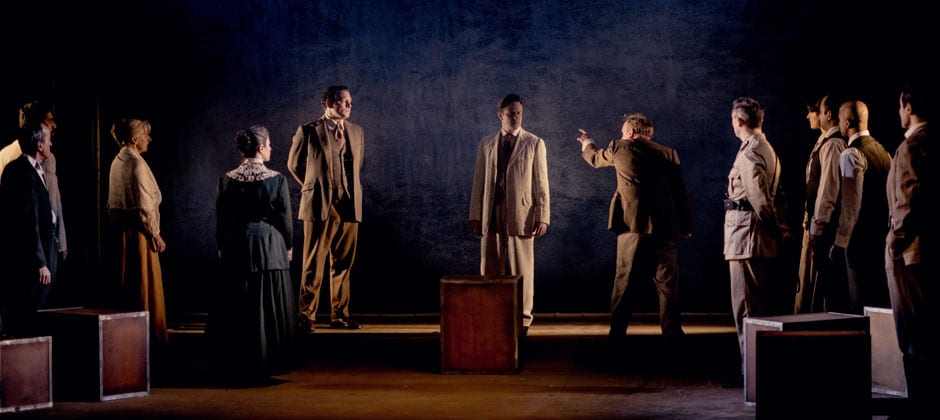Dormandy’s adaptation of E M Forster’s novel is provocative in its attention to colonial relations between British and Indian individuals; the play shows how strained hospitality becomes during moments of argument and strife.
The accusation of sexual misconduct by Adela (Phoebe Pryce) against Dr Aziz (Asif Khan) heightens tensions between natives and colonisers. Mrs Moore fails to exonerate the innocent Aziz because she doesn’t want to get dragged into a lengthy court battle, retreating instead back to England. The conviviality and enjoyment of India’s vibrant culture goes out of the window; previous affections are forever stained by the dark blot of this allegation.
Fielding (Richard Goulding) tries to straddle two worlds: the British club members fiercely champion the case of Adela and the Indians defend Aziz with equal vigour. Fielding is a close companion of Aziz and seeks to absolve him, but also is under pressure from his countrymen to stick with them. Ronny (Edward Killingback) is the presiding magistrate: he is pulled towards this false racist narrative of a violently deflowered English virgin, who happens to be his fiancé.
The actors on the British side do a fantastic job at showing how suddenly and alarming a situation can turn into venomous character defamation. McBryde (Christopher Doyle) adds a testimony to the mix, making a rather shocking attempt at expounding scientific thought. He says that feral darker-skinned people are sexually attracted to lighter-skinned ones and not vice versa, aping empiricism; it is anthropology gone sour.
One telling indicator of British incorrectness is when Ronny notices Aziz missing a collar stud and then comments on the shabbiness of Indians in wearing suits. Yet the stud is missing because Aziz generously donated it to Fielding who was without. So in reality a Briton is actually the culpable one for not dressing appropriately, but this small drama goes unchecked.
The set design proves that the beauty of India does not require salvation or alteration by British hands. There is a festival of colours with vibrant banners unfurled, and also the miming of sticky figs and mangoes being consumed; this all contributes to a sense of general splendour, but with a certain economy of production.
The echo is a central motif of A Passage to India. It is used at the start to demonstrate the indoctrination of the British into an attitude of superiority, as characters repeat a policy of stern ruling like a mantra; they perceive India to be a country with a primitive culture and therefore in need of external governance. In addition to this kind of echo, there is also the amplified booming effect of the fictional Marabar Caves. This is caused by its unique topography, which reduces every sound to a ‘boom’; this is sinister and discombobulating to unfamiliar tourists, and perhaps says something about how the exotic mystery of India is untameable.
The live music is a nice touch: cello and percussion helps immerse the audience in this rich and exciting native culture, but it is also used to convey the unnerving effects of the Caves. One quickly traverses into another: the smiling benevolence of xenia can switch into the heated belligerence of xenophobia, demonstrating how precarious relations between coloniser and colonised are in these times.

